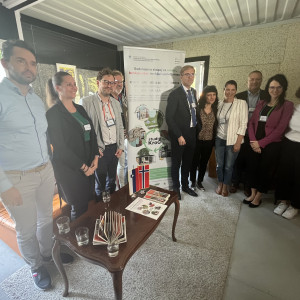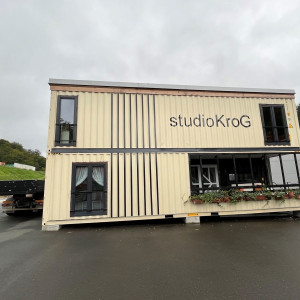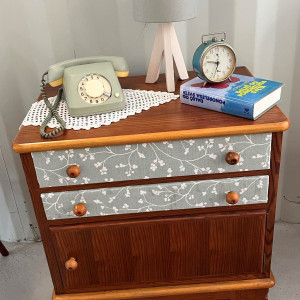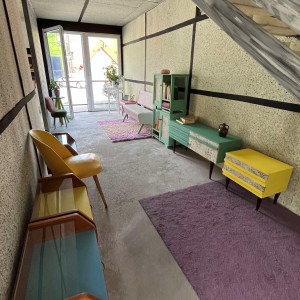

»Working together for a green, competitive and inclusive Europe«
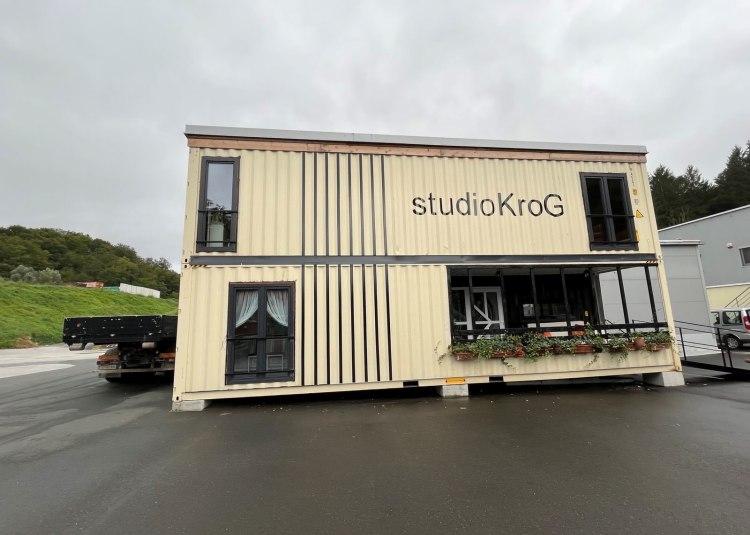
Studio Circular Economy project - studioKroG
The project "Circular Economy Studio - studioKroG" is co-financed by Norway with the Norwegian Financial Mechanism in the amount of EUR 776.975,00. Project duration: 1.5.2022 - 30.4.2024
PRESS RELEASE, Rogaška Slatina: 26 September 2023
StudioKroG - Slovenia's first demonstration centre for the circular economy, using second-hand shipping containers as an example
The project »Circular Economy Studio« presents the concept of the Norwegian approach, based on a minimalist look and approach without the use of virgin materials. By showing individual spaces, which function as a demonstration of the possible uses of waste as a resource, to better understand the upgrading of the circular economy. At the press conference we presented the StudioKroG project and its innovative solutions focusing on the use of shipping containers in architecture and construction in the context of the circular economy. The project, supported by the Norwegian Financial Mechanism, sets new standards for sustainability and re-use in these key sectors. The press conference featured speakers who underlined the importance of circular economy approaches in architecture, construction and in the development of our future. They presented their views and contributions to the development of a circular economy in Slovenia.
Mag. Bojan Pirš, Director of OKP Rogaška Slatina, a partner in the project, introduced the purpose and importance of the StudioKroG project. He highlighted the important role of local communities in shaping the future, which is also demonstrated by the example of the investment, which makes an important contribution to a wider understanding and competence in the field of circular resource use. He recalled that the first re-use centre in Slovenia started operating 13 years ago right here in Rogaška Slatina. "The circular economy and reuse are both key concepts that focus on sustainable resource management and reducing environmental impact," pointed out the Director of the OKP, Mr. Pirš. Meanwhile, he pointed out that the concept of reuse, which is implemented as a priority for waste minimisation, complements the circular economy concept with a holistic approach, higher economic value of products, a sustainable and long-term solution to the increasing waste volumes, which contributes to solving the global challenges of climate change and the depletion of natural resources.
At the press conference, Mr. Marko Koprivc, State Secretary of the Ministry of Cohesion and Regional Development, stressed the key role of the Ministry in promoting sustainable approaches and the importance of the circular economy. He highlighted key points such as support for sustainable development, as the Ministry of Cohesion and Regional Development is a key actor in shaping policies that promote sustainable development in Slovenia. This includes promoting practices that reduce the burden on the environment and increase the use of renewable resources, including through projects funded by the Norwegian Financial Mechanism. He pointed out that the circular economy can contribute to local development, reducing regional inequalities and creating jobs.
Dr. Jure Kotnik is a world-renowned architect of container construction. In a compelling speech, he demonstrated the innovation of shipping containers in architecture and their key role in circular concepts. He pointed out that shipping containers represent an innovative opportunity for construction that not only recycles existing materials, but also makes it possible to transform these industrial components into aesthetically appealing and functional architectural objects. He stressed their flexibility and the possibilities for creative design. He stressed the universality of the modular approach to architecture and its potential to address the various challenges faced by different societies. Dr Kotnik concluded by highlighting the inspiring aspects of container construction and its potential for creating a sustainable and aesthetically appealing future in architecture according to the circular economy principle. He encouraged reflection on how this approach can contribute to tackling global challenges such as climate change and pressures on natural resources.
Dr. Klavdija Rižnar, Project Manager, ZRS Bistra Ptuj, presented the development and implementation of sustainable solutions using the example of the StudioKroG project. She highlighted the main objectives of the project, including its contribution to sustainable construction, promotion of a circular economy and improvement of the quality of life in local communities. She highlighted how the project focuses its efforts on these objectives. She also discussed how the StudioKroG project represents the first demonstration centre of the circular economy, using the example of the reuse of used shipping containers as building elements and the concretised reuse and re-design of waste at the level of furnishing both the interior and exterior of the StudioKroG mobile building. She pointed out that sustainable solutions are adapted to the specific needs and environmental challenges of the local environments, which is an added value of the StudioKroG project.
Dr. Marinka Vovk, Head of Investment StudioKrog, Reuse Centre, took the participants through the practical implementation of circular concepts, highlighting circular approaches. She spoke about new trends and approaches used by the StudioKroG project, such as energy efficiency, the use of renewable energy sources, "waste design", industrial symbiosis, waste minimisation and fostering motivation for increased understanding of the circular economy through practical demonstrations. She reinforced that StudioKroG is the biggest opportunity for an increased understanding of the circular economy by showing how the problem ranges from the procurement of redundant shipping containers that are piling up in ports and warehouses due to globalisation, to the global problem of textile waste, which has a technological solution in textile insulation, as well as second-hand and redundant furniture and fittings that are transformed into usable products through the transformation process. She said that both investment sites are new demonstration centres with »nothing new«, they have a green roof, solar panels, textile insulation and represent a concretisation of the circular use of resources.
Polona Kukovec Lakota from RRC Ormož summarised the key findings of the awareness raising on circular economy and carbon footprint reduction. »Environmental information can raise people's awareness of environmental issues, leading to more sustainable choices«, she stressed the importance of implementing awareness-raising activities with different target groups, which involved more than 800 participants in the first year.
The fact that the StudioKroG project is not just a theory, but an effective practice, was also evident to the participants of the press conference when they entered the packaging operations carried out by the containers and saw three 12 m and one 6 m shipping containers in vertical and horizontal layout (100 m2). In practice, they saw that the use of shipping container architecture makes efficient use of existing resources, promotes sustainable construction and contributes to reducing waste and environmental impact, which is key to the circular economy.
More information:
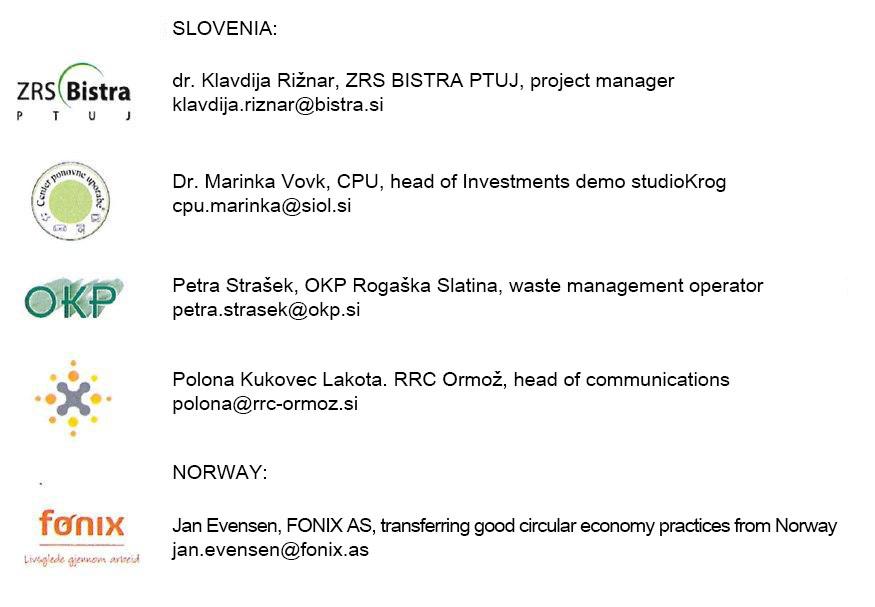
Project Consortium:

|
The studioKroG project is co-financed by Norway through the Norwegian Financial Mechanism in the amount of EUR 776.975,00. |
Disclaimer: »This press release has been produced with the financial support of the Norwegian Financial Mechanism. The contents of this document are the sole responsibility of the project consortium and can under no circumstances be regarded as reflecting the views of the Climate Change Mitigation and Adaptation Programme Operator.«


